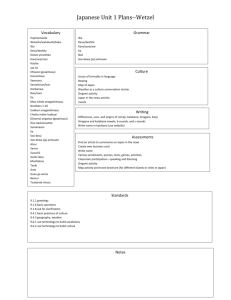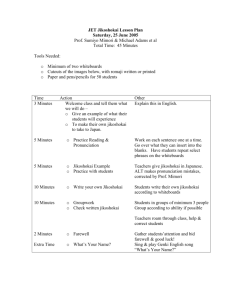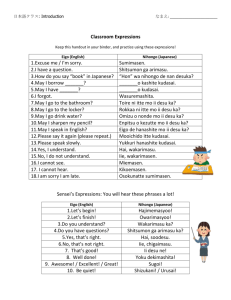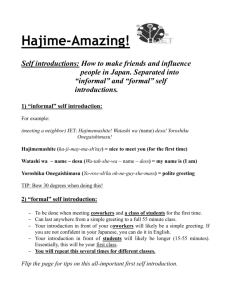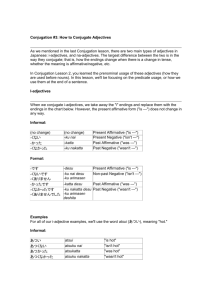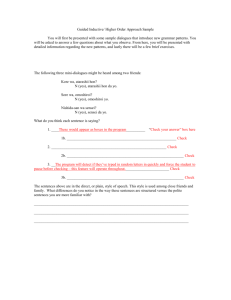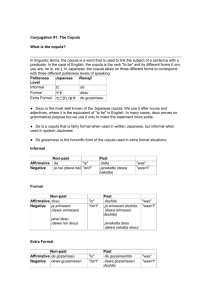Lesson Review – Two types of Japanese Adjectives
advertisement
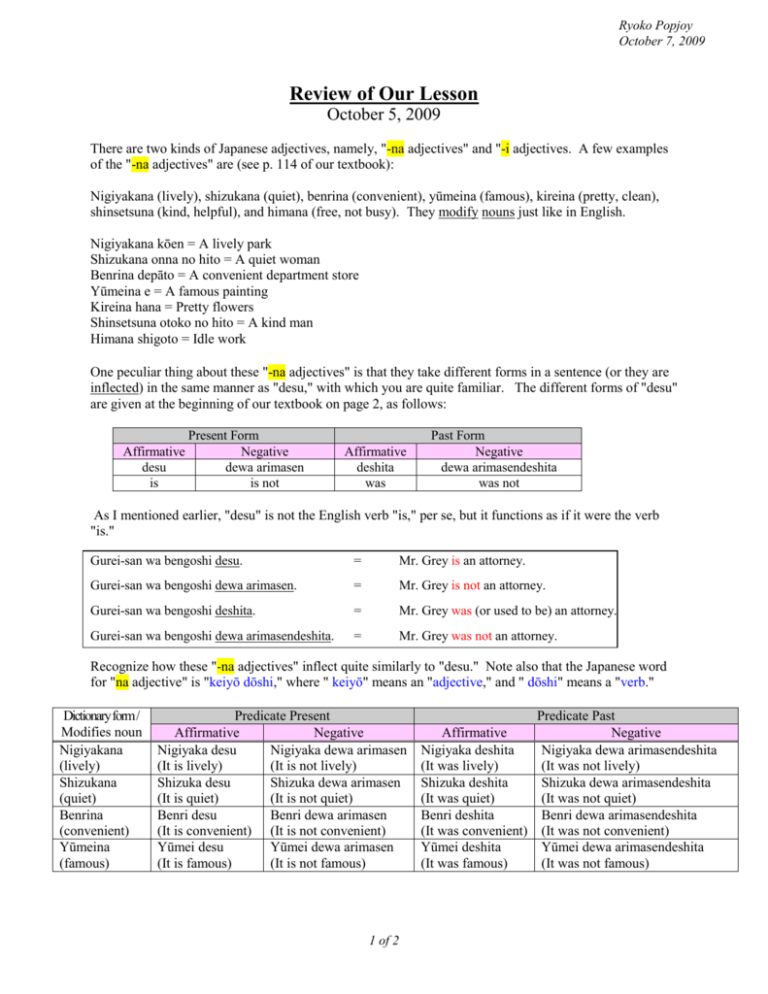
Ryoko Popjoy October 7, 2009 Review of Our Lesson October 5, 2009 There are two kinds of Japanese adjectives, namely, "-na adjectives" and "-i adjectives. A few examples of the "-na adjectives" are (see p. 114 of our textbook): Nigiyakana (lively), shizukana (quiet), benrina (convenient), yūmeina (famous), kireina (pretty, clean), shinsetsuna (kind, helpful), and himana (free, not busy). They modify nouns just like in English. Nigiyakana kōen = A lively park Shizukana onna no hito = A quiet woman Benrina depāto = A convenient department store Yūmeina e = A famous painting Kireina hana = Pretty flowers Shinsetsuna otoko no hito = A kind man Himana shigoto = Idle work One peculiar thing about these "-na adjectives" is that they take different forms in a sentence (or they are inflected) in the same manner as "desu," with which you are quite familiar. The different forms of "desu" are given at the beginning of our textbook on page 2, as follows: Affirmative desu is Present Form Negative dewa arimasen is not Affirmative deshita was Past Form Negative dewa arimasendeshita was not As I mentioned earlier, "desu" is not the English verb "is," per se, but it functions as if it were the verb "is." Gurei-san wa bengoshi desu. = Mr. Grey is an attorney. Gurei-san wa bengoshi dewa arimasen. = Mr. Grey is not an attorney. Gurei-san wa bengoshi deshita. = Mr. Grey was (or used to be) an attorney. Gurei-san wa bengoshi dewa arimasendeshita. = Mr. Grey was not an attorney. Recognize how these "-na adjectives" inflect quite similarly to "desu." Note also that the Japanese word for "na adjective" is "keiyō dōshi," where " keiyō" means an "adjective," and " dōshi" means a "verb." Dictionary form / Modifies noun Nigiyakana (lively) Shizukana (quiet) Benrina (convenient) Yūmeina (famous) Predicate Present Affirmative Negative Nigiyaka desu Nigiyaka dewa arimasen (It is lively) (It is not lively) Shizuka desu Shizuka dewa arimasen (It is quiet) (It is not quiet) Benri desu Benri dewa arimasen (It is convenient) (It is not convenient) Yūmei desu Yūmei dewa arimasen (It is famous) (It is not famous) 1 of 2 Affirmative Nigiyaka deshita (It was lively) Shizuka deshita (It was quiet) Benri deshita (It was convenient) Yūmei deshita (It was famous) Predicate Past Negative Nigiyaka dewa arimasendeshita (It was not lively) Shizuka dewa arimasendeshita (It was not quiet) Benri dewa arimasendeshita (It was not convenient) Yūmei dewa arimasendeshita (It was not famous) Dictionary form / Modifies noun Kireina (pretty/clean) Shinsetsuna (kind) Himana (idle) Predicate Present Affirmative Negative Kirei desu Kirei dewa arimasen She/it is pretty She/it is not pretty Shinsetsu desu Shinsetsu dewa arimasen (He/she is kind) (He/she is not kind) Hima desu Hima dewa arimasen (He/she is idle) (He/she is not idle) Affirmative Kirei deshita She/it was pretty Shinsetsu deshita (He/she was kind) Hima deshita (He/she was idle) Predicate Past Negative Kirei dewa arimasendeshita She/it was not pretty Shinsetsu dewa arimasendeshita (He/she was not kind) Hima dewa arimasendeshita (He/she was not idle) Some examples of the "-i adjectives" are given on p. 113 of our textbook. Here are the different forms of those adjectives, showing different inflections: Modifies Predicate Present Predicate Past noun Affirmative Negative Affirmative (*) Negative Ōkii Ōkii desu Ōkikunai desu/Ōkikuarimasen Ōkikatta Ōkiku arimasendeshita (big) (It is big) (It is not big) (It was big) (It was not big) Chiisai Chiisai desu Chiisakunai desu/Chiisakuarimasen Chiisakatta Chiisaku arimasendeshita (small) (It is small) (It is not small) (It was small) (It was not small) Takai Takai desu Takakunai desu/Takakuarimasen Takakatta Takaku arimasendeshita (expensive) (It is expensive) (It is not expensive) (It was expensive) (It was not expensive) Yasui Yasui desu Yasukunai desu/Yasukuarimasen Yasukatta Yasuku arimasendeshita (inexpensive) (It is inexpensive) (It is not inexpensive) (It was inexpensive) (It was not inexpensive) Atarashii Atarashii desu Atarashikunai desu/Atarashikuarimasen Atarashikatta Atarashiku arimasendeshita (new) (It is new) (It is not new) (It was new) (It was not new) Furui Furui desu Furukunai desu/Furukuarimasen Furukatta Furuku arimasendeshita (old) (It is old) (It is not old) (It was old) (It was not old) Chikai Chikai desu Chikakunai desu/Chikakuarimasen Chikakatta Chikaku arimasendeshita (near) (It's near) (It is not near) (It was near) (It was not near) Tōi Tōidesu Tōkunai desu/ Tōkuarimasen Tōkatta Tōku arimasendeshita (far) (It is far) (It is not far) (It was far) (It was not far) Muzukashii Muzukashiidesu Muzukashikunai desu/ Muzukashikatta Muzukashiku (difficult) (It's difficult) Muzukashikuarimasen (It's not...) (It was difficult) arimasendeshita (It was not...) Yasashii Yasashii desu Yasashikunai desu/ Yasashikatta Yasashiku arimasendeshita (easy) (It is easy) Yassashikuarimasen (It's not...) (It was easy) (It was not easy) Amai Amai desu Amakunai desu/Amakuarimasen Amakatta Amaku arimasendeshita (sweet) (It is sweet) (It is not sweet) (It was sweet) (It was not sweet) Karai Karai desu Karakunai desu/Karakuarimasen Karakatta Karaku arimasendeshita (spicy) (It is spicy) (It is not spicy) (It was spicy) (It was not spicy) Atsui Atsui desu Atsukunai desu/Atsukuarimasen Atsukatta Atsuku arimasendeshita (hot) (It is hot) (It is not hot) (It was hot) (It was not hot) Samui Samui desu Samukunai desu/Samukuarimasen Samukatta Samuku arimasendeshita (cold) (It is cold) (It is not cold) (It was cold) (It was not cold) Ii/Yoi Ii desu Yokunai desu/Yokuarimasen Yokatta Yoku arimasendeshita (good) (It's good) (It's not good) (It was good) (It was not good) Omoshiroi Omoshiroi desu Omoshirokunai desu/ Omoshirokatta Omoshiroku arimasendeshita (interesting) (It's interesting) Omoshirokuarimasen (It's not...) (It was ...) (It wasn't interesting) Isogashii Isogashii desu Isogashikunai desu/ Isogashikatta Isogashiku arimasendeshita Isogashikuarimasen Oishii Oishii desu Oishikunai desu/Oishikuarimasen Oishikatta Oishiku arimasendeshita * I will additionally explain in class about the "Affirmative Predicate Past" form of these "-i adjectives," such as Ōkikatta, Takakatta, etc. 2 of 2
